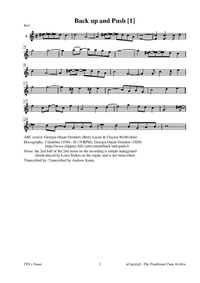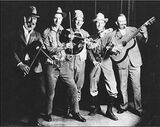Template:Pagina principale/Vetrina: Difference between revisions
No edit summary |
No edit summary |
||
| Line 1: | Line 1: | ||
{{SheetMusic | {{SheetMusic | ||
|f_track= | |f_track=Back Up and Push.mp3 | ||
|f_pdf= | |f_pdf=Back up and Push.pdf | ||
|f_artwork= | |f_artwork=Organgrinders.jpg | ||
|f_tune_name= | |f_tune_name=Back Up and Pus | ||
|f_track_title= | |f_track_title=Back_Up_and_Push_(1) | ||
|f_section=abc | |f_section=abc | ||
|f_played_by=[https://soundcloud.com/ | |f_played_by=[https://soundcloud.com/thegreatamericanstringband The Great American String Band] | ||
|f_notes= | |f_notes=In the photo is Bert Layne, Lowe Stokes, unknown, Clayton McMichen and Claude Davis | ||
|f_caption= | |f_caption=The Organ Grinders featured fiddlers Bert Layne and Clayton McMichen, while another Skillet Lickers fiddler, Lowe Stokes, played the organ on this cut (more prominent in the second strain of the tune on the recording). | ||
|f_source=[https://soundcloud.com/ | |f_source=[https://soundcloud.com/thegreatamericanstringband/back-up-and-push Soundcloud] | ||
|f_pix=420 | |f_pix=420 | ||
|f_picpix=200 | |f_picpix=200 | ||
|f_article=[[ | |f_article=[[Back_Up_and_Push_(1) | '''Back Up and Pus''']] | ||
"Back up and Push [1]" was first recorded by the Georgia Organ Grinders in Atlanta in 1929 for Columbia Records. The group was one of the several Skillet Licker off-shoot groups, whose members combined and recombined in different formations for various ventures. | |||
The Organ Grinders featured fiddlers Bert Layne and Clayton McMichen, while another Skillet Lickers fiddler, Lowe Stokes, played the organ on this cut (more prominent in the second strain of the tune on the recording). | |||
The 1929 session was their only recording date, and they cut six side, all issued by Columbia Records. | |||
A later Skillet Lickers ensemble, led by Gid Tanner, recorded a version in 1934 (backed with "Down Yonder") that became the third best-selling country music record for that year. Gid's son, 17 year old Gordon Tanner, played uncredited fiddle lead at the session, according to researcher Tony Russell. | |||
The jazz-influenced tune is now widespread, having been popularized by bands such as Bill Monroe's and Benny Martin's, and influential fiddlers Kenny Baker, Buck Ryan, and others. | |||
The second part of some versions is little more than a 'double shuffle' (aka hokum shuffle or OBS/Orange Blossom Special shuffle) on the chords F, C and G. | |||
}} | }} | ||
Revision as of 12:18, 28 January 2024

Played by: The Great American String Band
Source: Soundcloud
Image: In the photo is Bert Layne, Lowe Stokes, unknown, Clayton McMichen and Claude Davis

"Back up and Push [1]" was first recorded by the Georgia Organ Grinders in Atlanta in 1929 for Columbia Records. The group was one of the several Skillet Licker off-shoot groups, whose members combined and recombined in different formations for various ventures.
The Organ Grinders featured fiddlers Bert Layne and Clayton McMichen, while another Skillet Lickers fiddler, Lowe Stokes, played the organ on this cut (more prominent in the second strain of the tune on the recording).
The 1929 session was their only recording date, and they cut six side, all issued by Columbia Records.
A later Skillet Lickers ensemble, led by Gid Tanner, recorded a version in 1934 (backed with "Down Yonder") that became the third best-selling country music record for that year. Gid's son, 17 year old Gordon Tanner, played uncredited fiddle lead at the session, according to researcher Tony Russell.
The jazz-influenced tune is now widespread, having been popularized by bands such as Bill Monroe's and Benny Martin's, and influential fiddlers Kenny Baker, Buck Ryan, and others.
The second part of some versions is little more than a 'double shuffle' (aka hokum shuffle or OBS/Orange Blossom Special shuffle) on the chords F, C and G.
...more at: Back Up and Pus - full Score(s) and Annotations
X:0 T:Back up and Push [1] S:Georgia Organ Grinders (Berty Layne & Clayton McMichen) M:C| L:1/8 R:Reel N:the 2nd half of the 2nd strain on the recording is simple arpeggiated N:chords played by Lowe Stokes on the organ, and is not transcribed. D:Columbia 15394 - D (78 RPM), Georgia Organ Grinders (1929) D:https://www.slippery-hill.com/content/back-and-push-0 Z:Transcribed by Andrew Kuntz K:C V:1 clef=treble name="0." [V:1] [^de]-[ee]-[ee]dc2 |d4 A4-|A2[^de]-[ee]- [ee]dcA|[E8c8]-|[E2c2][E3c3]cd2| g4 g4-|g2 (ab-) bage|g8-|g2 [^de]-[ee]-[ee]dc2 | d4 A4-|A2[^de]-[ee]- [ee]dcA|c4G4-|G2 Gc2de2| g4g4-|g2^de2=de2|c4-cABG|c4d2e2|| f2cf- fcf2|A4c2(d2|e2)g2 edc2|G6 [^de]-| [e2e2]dB- BGAB|+slide+[e2e2]d2 BGAB|c8|
